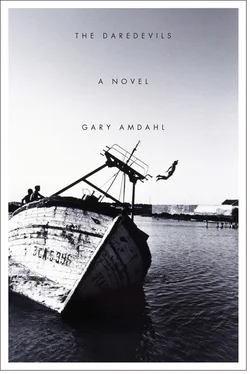And he was able “to be in love” with Vera.
Which was not to say that he was free of his creamy blue-veined marble character, his personality of privilege and its habitual weaknesses, its routines of intellectual passion — the nearly impervious Charles Minot-ness that was inseparable from the dictates of his ceaselessly and excellently-trained brain and the receipt of constant confirmation from all those other brains around it — of the reality he had counter-trained himself to disavow for a decade. He was not free of the necessary falseness of reality, not free of the stage, but wished to be. He embodied this wish as “Vera.”
He found as well that he was becoming altogether welcoming of alcohol and narcotics and firearms — things that had never had lives of their own, things that had been present, certainly, but only unremarkably so, in a family whose patriarch was not only a Westerner, but one who had been shot twice representing law and order and nearly been blown to pieces in a natural disaster. He was susceptible to “thrills,” to “somnolence” or at least to the ideas of same, to inner thrills, if he could put it that way, and superhuman manifestations of same — thanks to Vera, who had her own frank but mysterious need of them in her drugged entanglements, and thanks to the fact that someone had tried and nearly succeeded in blowing him, Father’s boy, after all, to pieces in a political disaster — shredding, if truth be told, his nerves once and for all. Vera knew, had known for some time, long before she met Charles, how perilously close to sudden death she — everybody — was living. But that was remedial, not mysterious, a superficial explanation, not a need. When she talked about it, when she felt she could and wanted to talk about it, she could only speak of home and exile. The world is the dark and our home is the light. Evil wants to return to its home in the light just as much as good does. Good and evil was useless distinction, if not an altogether maliciously false one. Charles said she was a gnostic and that he wanted to learn the gnosis from her. Which of course made her laugh and cry and laugh and cry, and drink and fuck and take on a reckless attitude to work that could, at some point in one of a hundred projected futures, become dangerous. That would.
But if there was nothing you could do about it, did you want to talk about it? Or not.
Vera struggled with what she quickly chose to call her “addiction”—though to what, precisely, could not be ascertained — far more desperately than Charles did — she had been at it longer, he supposed, but he was better at it because his nerves, he now saw so clearly, had been ruined when he was a child, and it made him weak and sick. Vera was not sick and weak or fragile, but she spoke more and more of a friend who had died in New York three years earlier, Rosemary, who was simply a fragile person, talking as if Rosemary had been a part of her that had suffered and died to allow Vera to suffer and live. It was a variation not at all lost on Charles of the understudy who had been onstage where Vera had been meant to be. Rosemary had a story about her father, who worked on a match factory, toiling over phosphorus fumes that had made his bones brittle: Rosemary said she saw her father step awkwardly from a curb, saw the twisted ankle break, saw her father falling and cracking to pieces, and it seemed to Vera more and more likely every time she told the story. She had left Muscatine and buttons for Willimantic and thread, and a strike that was getting national attention. Body and soul were strung together with Willimantic thread and wrapped in smoke. It was possible Rosemary was some kind of otherworldly creature, a goddess, even, Vera didn’t know. But she clung to her as the world wove the fabric of affliction ever more densely.
“We lived,” she told Charles, “in a worker’s paradise. That was how I liked to put it, it made Rosemary laugh, and that was all there was to it. We were just teenaged girls, and we liked to laugh. We called ourselves ‘The Champions of Work’ and we whistled a great deal. The owners were in fact kind and generous people, decent, intelligent people, and were famous for those qualities in all the mill towns of southern New England. They built an opera house in which works by all the greatest composers were performed: Verdi, Rossini, Bellini, Donizetti, Ponchielli, Puccini, Giordano, Cilea, Catalani, Leoncavallo, Mascagni — oh, I could go on and on!”
“You will forgive me if I don’t quite believe you.”
“I remember German and French names as well — tip of my tongue, can’t quite get to them, though I am sure I will remember before I get to the end of this story. We never saw a performance, of course, but the owners made sure that singers with incredibly loud voices and insanely gorgeous clothing provided free concerts in the parts of the mill that weren’t so noisy you couldn’t hear even the loudest tenor wailing directly into your ear. Once there was a free concert by the lake in Coventry, on a Sunday. There were many, many people of Italian ancestry working in the mill (myself included) who could appreciate the lyrics just as they were sung, but we were proud of the diversity of our workforce: it’s not much of an exaggeration to say that we came from the four corners of the earth. The owners, I know for a fact, subsidized the emigration of peoples from fourteen nations, including Syria, Borneo, and Patagonia. We enjoyed exotic foods, vibrant festivals celebrating ancient and obscure rites, and the glorious singing I have already mentioned, the singing of songs that made the whistling we engaged in while working something entirely out of the ordinary. We sang, too, once I’d taught the words to her, seeing who could sing the loudest. She fancied herself Italian, and could have passed for Italian in all but the most rigorous of audits. Rosemary said she knew nothing of the circumstances of her birth. I could not imagine such a life. I could not believe it was true — but of course she was right: none of us can know. I was not at all sure but I think I envied her: all that trackless solitude where there was nothing for me but immensities of architecture. She did believe that the man and the woman with whom she lived in the earliest years in Willimantic were in fact her mother and father. The father had been employed for several years as a matchmaker, which meant that he worked unshielded over great tubs of white phosphorus, the fumes of which in that cramped and dirty, unventilated shop rose up and hung in the air like the ghosts of all the tyrants of history and prehistory, or like fallen angels from which even evil had been wasted, leaving only a radiant, naturally occurring poison. With his head in these clouds twelve hours a day and his hands in the tubs dipping and plucking thousands of little sticks, he began to come apart. At first made only nervous and irritable, he suffered headaches and losses of memory that he knew were so near and yet gone, she said, that they reduced him to weeping. Then he became simple and docile and yet somehow witty, full all of a sudden and for no reason with gems of wisdom. He spoke in a kind of singsong that often rhymed. As his brain became desiccated, so did his bones become brittle. His jaw rotted and his teeth fell out, and one day, waiting for the Sunday excursion train to Coventry where we planned to sit by the lake and listen to the lapping water and hopefully the opera stars too, holding Rosemary’s little hand in his frail yet still warm and big own, he stepped off the curb, found the street further below than he’d imagined, and broke his ankle when he touched down. In a kind of chain reaction, the bones of his left leg broke, and when he swung himself wildly to the right, the bones of that foot and leg snapped also. He collapsed in a bloody, powdery heap, pelvis, backbone, and neck cracking in swift succession. Finally his poor skull shivered like an egg-shell, leaving smiling face and cooling brain to rest softly on the cobbles of the street. Thus, at any rate, did my Rosemary narrate the tragedy, the tale of the matchmaker sick with phossy jaw who broke his leg stepping off the curb: many times and in many places, for many different reasons. She did not understand what had happened. Neither did I. She did not understand where her father had gone, nor why. Neither did I.”
Читать дальше












